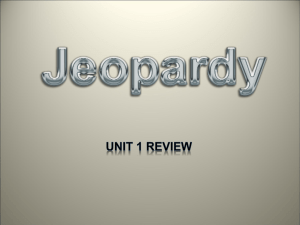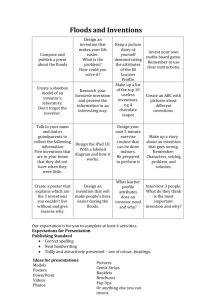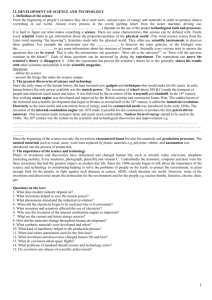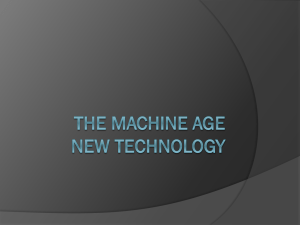University of Wisconsin-Stout Policy PATENT POLICY
advertisement
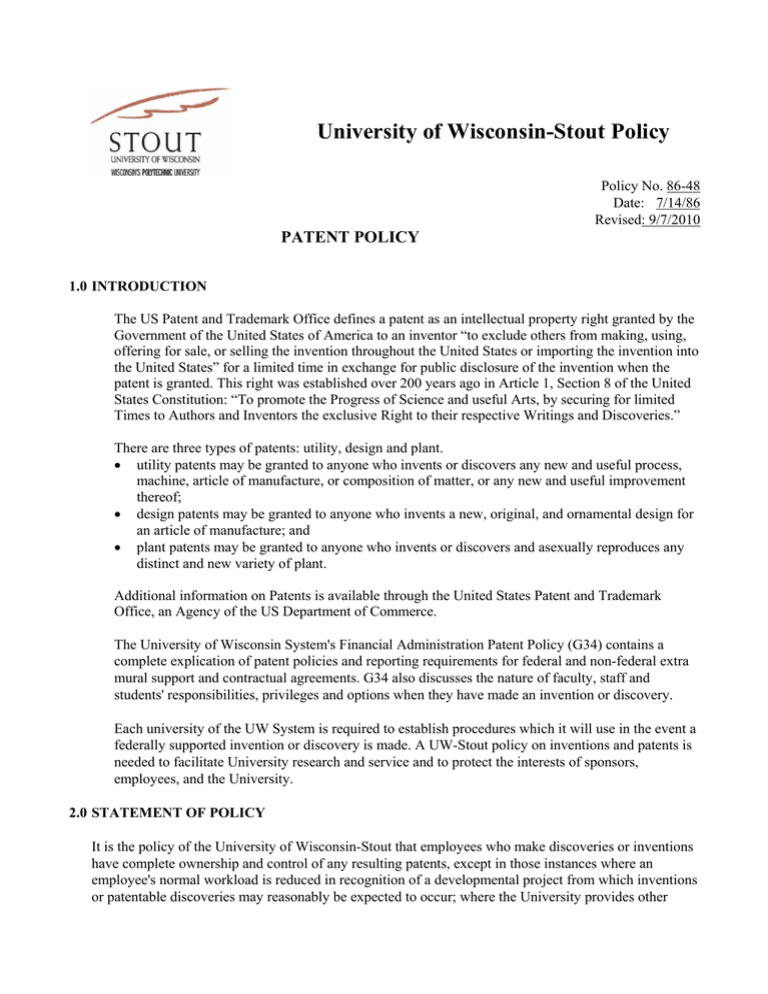
University of Wisconsin-Stout Policy Policy No. 86-48 Date: 7/14/86 Revised: 9/7/2010 PATENT POLICY 1.0 INTRODUCTION The US Patent and Trademark Office defines a patent as an intellectual property right granted by the Government of the United States of America to an inventor “to exclude others from making, using, offering for sale, or selling the invention throughout the United States or importing the invention into the United States” for a limited time in exchange for public disclosure of the invention when the patent is granted. This right was established over 200 years ago in Article 1, Section 8 of the United States Constitution: “To promote the Progress of Science and useful Arts, by securing for limited Times to Authors and Inventors the exclusive Right to their respective Writings and Discoveries.” There are three types of patents: utility, design and plant. • utility patents may be granted to anyone who invents or discovers any new and useful process, machine, article of manufacture, or composition of matter, or any new and useful improvement thereof; • design patents may be granted to anyone who invents a new, original, and ornamental design for an article of manufacture; and • plant patents may be granted to anyone who invents or discovers and asexually reproduces any distinct and new variety of plant. Additional information on Patents is available through the United States Patent and Trademark Office, an Agency of the US Department of Commerce. The University of Wisconsin System's Financial Administration Patent Policy (G34) contains a complete explication of patent policies and reporting requirements for federal and non-federal extra mural support and contractual agreements. G34 also discusses the nature of faculty, staff and students' responsibilities, privileges and options when they have made an invention or discovery. Each university of the UW System is required to establish procedures which it will use in the event a federally supported invention or discovery is made. A UW-Stout policy on inventions and patents is needed to facilitate University research and service and to protect the interests of sponsors, employees, and the University. 2.0 STATEMENT OF POLICY It is the policy of the University of Wisconsin-Stout that employees who make discoveries or inventions have complete ownership and control of any resulting patents, except in those instances where an employee's normal workload is reduced in recognition of a developmental project from which inventions or patentable discoveries may reasonably be expected to occur; where the University provides other support or involvement for such a project; or where such inventions or discoveries are produced as a result of agreements between the University and extra mural sponsors. In such cases, the procedures described below must be followed and University employees must cooperate in honoring all contractual commitments. Patents may be produced or developed under at least the following five conditions: 1) No University support or involvement, 2) Minimal University support and involvement, such as the use of laboratories and/or equipment, but with no release time from assigned duties, 3) Substantial University support and involvement and/or release time provided with the expectation that patentable information or products will result, 4) An assigned duty and/or work-for-hire arrangement, or 5) Support from an extra mural sponsor. It is the policy of UW-Stout that patentable discoveries or developments produced as stated in (1) and (2) above shall belong solely to the inventor(s). 2.1 Invention and Patent Agreements. Patentable discoveries or developments produced with substantial institutional support and/or release time as in (3) above shall be the subject of a written understanding or agreement between the inventor or inventors and the Chancellor, or his/her designee, which equitably determines patent and ownership rights. This agreement must clearly define the rights and responsibilities of all principal parties. Such a written understanding must precede the initiation of work under such arrangements. If the institution chooses not to seek patent on such discoveries or developments according to a time schedule and arrangements which shall be include in the written understanding, the inventor has the option to do so in his or her own name. When the production or development of patentable discoveries or inventions is a primary purpose of employment as in (4) above, a written work-for-hire agreement shall be executed prior to initiation of the work. Payment shall be made to the employee and the institution shall receive all rights to the patentable discoveries or inventions and receive all royalties and fees. When such inventions or discoveries are produced as an assigned duty, the institution shall own all rights and receive all royalty of licensing fees except where contrary agreements have been reached between the inventor and the Chancellor, or his or her designee, prior to initiation of the work. Whenever patentable inventions or discoveries are produced with extra mural support as in (5) above, the agreement with the extra mural sponsor shall be considered in determining the ownership rights of the parties. 2.2 Invention Record and Report. To establish the rights and options of all parties, the following steps should be taken when an invention is made: A. The inventor should: (1) Prepare a written disclosure in the format prescribed, and (2) Forward the disclosure through the appropriate department head or chair and Dean, to the Office of Research Services. B. If the invention was made in connection with an extramurally sponsored research project, the Office of Research Services will forward a disclosure to the sponsor. C. Following a review of the salary and grant support of the inventor, the Vice Chancellor for Administrative and Student Life Services will notify the inventor concerning rights and options.
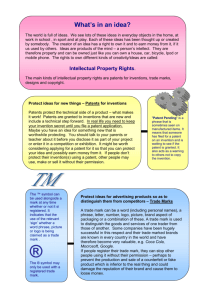
![Introduction [max 1 pg]](http://s3.studylib.net/store/data/007168054_1-d63441680c3a2b0b41ae7f89ed2aefb8-300x300.png)
